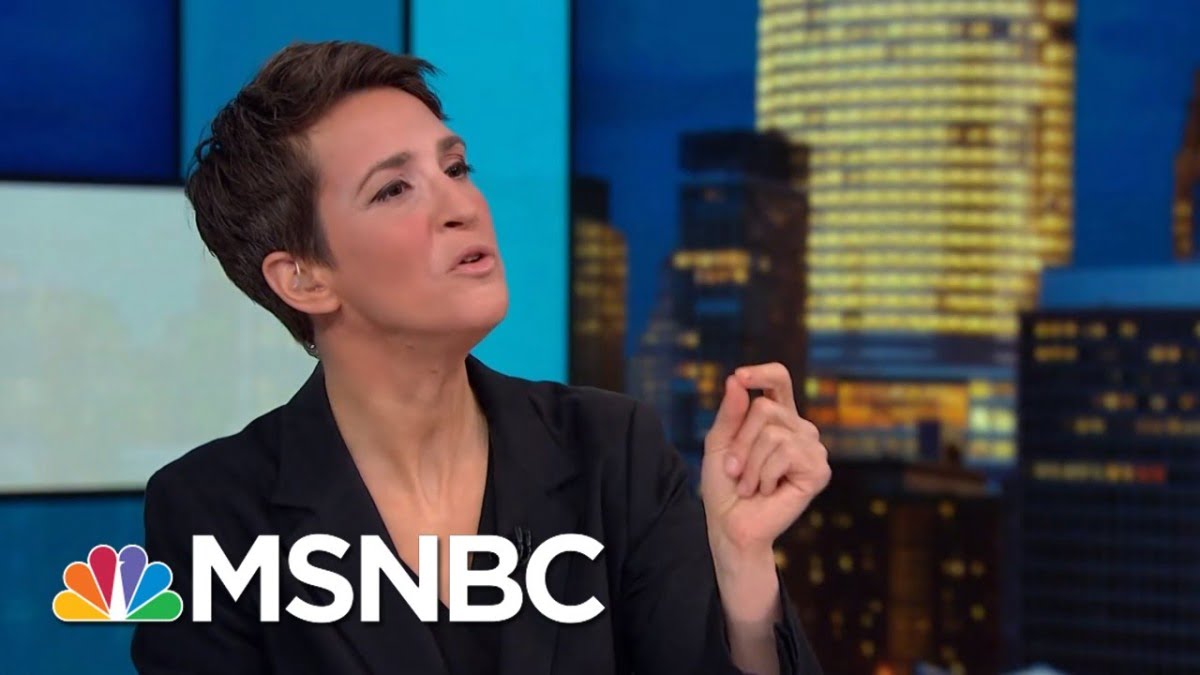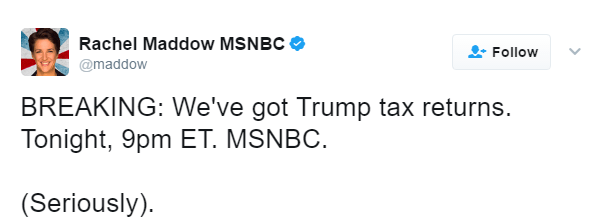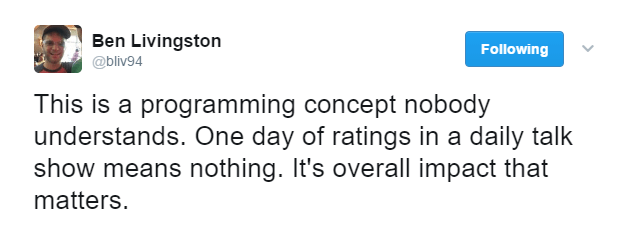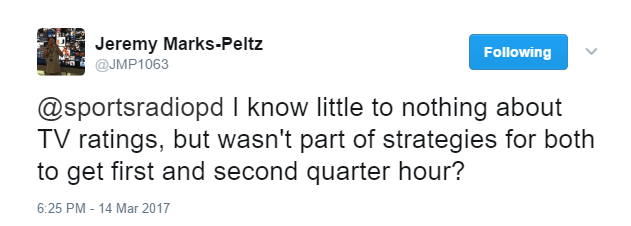On Tuesday night, Rachel Maddow of MSNBC had the entire world eating out of the palm of her hand. Except she forgot the most important item – the food.
Time and time again it’s been proven that Americans are suckers for hype. Networks and their on-air stars grace our airwaves and social media platforms, and tell us that they have something big, and immediately we start sharing, speculating and debating it with our friends, family and co-workers, working ourselves up into a frenzy prior to the big reveal.
But getting an audience to tune in one time for your content isn’t difficult. If you have something unique, and promote it effectively, people will stop by to see what all the buzz is about. The real challenge is delivering on what you promised when they show up, and rewarding them with a positive experience so they consider becoming repeat customers of your program.
If a restaurant in your neighborhood runs commercials and places signs in their windows hyping up that they have the best steak in town, you might consider eating there. But if you enter the establishment, and the wait staff ignores your table for a half an hour, and the steak they present is cold and tough to devour, then it’s unlikely you’ll return for a second visit.
This is what happened to Rachel Maddow on Tuesday night. She provided poor customer service, and a cold steak that few enjoyed eating.
I didn’t take the bait when I saw MSNBC touting they had Donald Trump’s tax return from 2005, because my immediate reaction was that the material was 12 years old (way before he entered politics, and the equivalent of three presidential terms ago), and I didn’t expect MSNBC to provide a fair and balanced discussion on the subject since they lean left. If the same situation unfolded and a democrat was president, I wouldn’t have turned to FOX News, because they do the same exact thing, except they serve the right side of the audience.
But when I saw my Twitter timeline begin to fill with emotional responses from many throughout the sports media, I became intrigued. The general consensus was that Maddow had promised something big, viewers tuned in for it, and were then strung along for a while before she provided a payoff, which was less than spectacular.
I then recorded the show to watch it afterwards because I was curious if she made the same tactical mistakes that ESPN did when they trotted out Jim Gray for the LeBron James special. If you remember that failed production, viewers (especially those in Cleveland) were put through an exhausting couple of segments, listening to LeBron talk about the ups and downs of his previous season, and his connection to the Boys and Girls club, only to learn at the end that he was leaving his hometown team to join the Miami Heat.
Although “The Decision” was awful, it did provide a big payoff. LeBron announced he was leaving the Cavaliers, and cameras captured immediate footage from Cleveland where people were visibly upset. Maddow on the other hand not only executed her show using the same failed playbook, but her grand finale was the equivalent of LeBron telling Jim Gray he still hadn’t made a decision on his future.
Rule number one if you’re a talk show host, never promise the audience red meat if you don’t have it. When you build your content around the President of the United States, a man who many will passionately defend or go to extremes to have impeached, and you tell the world you have exclusive information that’s going to interest them, you can’t then show up with only two pages of a tax return, one which shows that he paid a higher percentage of taxes than other presidents and candidates, and close to forty million dollars. That makes people angry.
Rule number two, if you have the smoking gun, and have convinced the world to stop by to hear about the evidence on your show, do not make the critical mistake of making the audience wait to try and gain one or two quarter hours of ratings credit. You might win this particular night, but you’ll never win another one. Word gets around quickly that you promise a lot, but deliver a little.
I saw a few of my industry friends on Twitter debating this issue Tuesday night, and I understood their points about Maddow playing the TV game to help her numbers. A few folks mentioned that she did her job to get people to tune in. Others commented that she created conversation about the show and was trending on Twitter because of her approach in making the audience wait.
There’s some truth in those commentaries, except there’s one critical point missing – she was already going to have a big ratings night because of the claim of having exclusive information on the President.
When you have the world’s attention, the way Maddow did on Tuesday night, you can’t afford to toy with the audience. Maddow chose to start her program with an extended twenty minute monologue, followed by a commercial break. She assumed that because she had information that nobody else did, that she could hold onto it for an extended period of time. But by operating that way, she not only pissed off the audience, but they were out for blood as soon as it was discovered that her evidence didn’t match up to the hype.
This is why people rejected ESPN for “The Decision”. It’s the same reason sports fans became upset with last year’s CBS Selection Sunday show. There are times when you play the quarter hour game, but not when you’re handed crucial information that the world is turning to you to learn about it.
When an opportunity of this magnitude lands on your plate, you have a simple job to do. Set up the story by providing insight on how you gained the information, and then provide the payoff. The sooner the audience gets it, the better, and the more satisfied they will be. You can add your analysis, post-monologue, guests, and other show elements afterwards.
Rachel Maddow’s biggest mistake on Tuesday night was that she thought more about her ratings, rather than the the people who actually provide those ratings spikes. When you execute that way, you lose every time. I’m sure MSNBC will see a boost in Maddow’s Tuesday night’s numbers. But that’s only one night. If the audience doesn’t return Wednesday, Thursday and beyond, then that tells you a huge opportunity was wasted.
Maddow can take solace in the fact that she was able to deliver her commentaries on Donald Trump to a large number of new viewers who might not have been familiar with her show or style. But turning those casual viewers into repeat customers was tossed out the window when she held on to the evidence too long, and then failed to produce material that would make the wait worthwhile.
On a normal night, she can execute a show that’s built for quarter hour viewing. The structure may involve a monologue in the first segment, a second topic or extension of the first topic in segment 2, and then a guest to offer analysis and opinion in the third segment. That plan makes sense most times.
But these situations follow a different set of rules, and require a different strategy.
If Barry Bonds agreed to come on your program and admit to the world that he used steroids, you wouldn’t wait 7 or 8 questions into the interview to ask him. If you did, the audience would turn on you. If you possessed a photograph proving that O.J. Simpson did in fact murder his ex-wife Nicole, you wouldn’t wait 20-30 minutes to show it, otherwise you’d earn the wrath of the audience.
In each of those examples, when you proclaim to have something exclusive, that will warrant the entire nation’s attention, it better be strong, and it better be delivered immediately. Rachel Maddow missed on both fronts.
Which is why the world is now talking about her failed performance, rather than the President’s taxes, something nobody could have believed was possible 48 hours ago. But when you ignore the audience’s demands for the betterment of your ratings, it carries lasting consequences. Rachel Maddow is now fully aware.

Jason Barrett is the President and Founder of Barrett Media since the company was created in September 2015. Prior to its arrival, JB served as a sports radio programmer, launching brands such as 95.7 The Game in San Francisco, and 101 ESPN in St. Louis. He also spent time programming SportsTalk 950 in Philadelphia, 590 The Fan KFNS in St. Louis, and ESPN 1340/1390 in Poughkeepsie, NY. Jason also worked on-air and behind the scenes in local radio at 101.5 WPDH, WTBQ 1110AM, and WPYX 106.5. He also spent two years on the national stage, producing radio shows for ESPN Radio in Bristol, CT. Among them included the Dan Patrick Show, and GameNight.
You can find JB on Twitter @SportsRadioPD. He’s also reachable by email at Jason@BarrettMedia.com.










